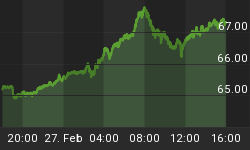At the end of April we mentioned that although the trend of the SPX continues to be up, there's a major reason for concern considering the divergence between the SPX and the DJIA on the one hand, and the IWM on the other. This was perfectly highlighted last week when both the SPX and the DJIA registered new highs only to pull back and have the IWM test critical support level in the 107-108 zone two days in a row:
The implications of this divergence are pretty straighforward. As long as the IWM manages to stay above that key support level, the SPX and the DJIA are likely to keep scoring new highs, with major resistance coming at 1950 for the SPX. A break below the 107 level for the IWM is likely to coincide with a break below support and bullish trendlines for the SPX, and signal a change in trend for that index as well:
The outlook for gold and silver didn't change during that period. They both hover just barely above key support levels despite intensifying geopolitical tensions. Just like in April, we still cannot get bullish on gold until it breaks above the 50% retracement level:


















